In addition to seasoned professionals, young alumni sat on panels representing people of color, social justice activists, and LGBTQ communities. Natalie Erasme, FCRH ’18, an intern at the New York City Department of Health and Mental Hygiene, said she wanted to share recent experiences with undergraduates.
“It’s really important for alumni who are not too far out in the workforce to come back, because things are changing rapidly, and the experience of transitioning to the workforce from school is fresh in our mind,” said Erasme, who sat on the social justice panel.
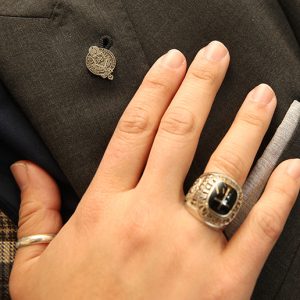
Paola Joaquin Rosso, FCRH ’17, said she attended conferences for years as a student and found being on the LGBTQ panel with like-minded alumni “very calming.” Rosso works with Make the Road New York, a nonprofit group that provides resource assistance to low-income families.
“It was good to be in a room with a decent amount of people who are engaged and had really good questions for us,” she said.
Claudia Law, FCRH ’16, wore a Fordham pin on her lapel and a class ring on her finger, which she said she always wears. She was proud to share her success story. At just 25, she is the director of operations at Progressive Pipeline Management, an infrastructure firm that handles chemical and natural gas pipelines.
“It feels great because in three short years a lot has changed and I’ve made a lot of myself,” she said, beaming.
Most of the alumni promoted diversity during their time at Fordham and were curious to see if their efforts were continuing.
Daniel Stroie, GABELLI ’17, ’18, was a resident assistant and was involved in United Student Government (USG). He said that he was pleased to see all gender bathrooms and hoped it signified more than a “cosmetic change.”
“It definitely shows a change in mindset,” he said.
Creating Civil Discourse
Indeed, physical space, whether a bathroom or the borough, was a big topic. Most Rose Hill commuter students are people of color, and many hold definite ideas about community, both on campus and off.
“The students here now are doing a great job at being able to vocalize the needs of the commuter population in student life,” said Rosso.
Bronx-born Erasme said that during her time on campus, she found community through the Dorothy Day Center, which has since been incorporated into the Center for Community Engaged Learning. There, she met resident students willing to engage with residents of the Bronx through College Access, a student-led group that helps teens through the college application process.
“Everyone needs to be open to the broader discussions,” she said.
Ashley Qamar, a Gabelli School junior who co-chairs the Diversity Action Coalition, a USG committee working with students on minority issues, concurred with Erasme.
“The face of a Fordham student has changed so much from now versus ten years ago, and we need to address that,” she said.
Qamar, who identifies as a “straight Asian Latina,” said that events like the conference create community. She praised the visibility of Juan Carlos Matos, the assistant vice president for Student Affairs for Diversity and Inclusion, and Chief Diversity Officer Raphael Zapata, whose offices partnered on the event, which was sponsored by Career Services. She cited a recent art opening for women of color held at both the Rose Hill and Lincoln Center campuses as an example of a forward-thinking approach.
“I have never been to an event like that at Fordham, and it was so unbelievably beautiful,” she said.
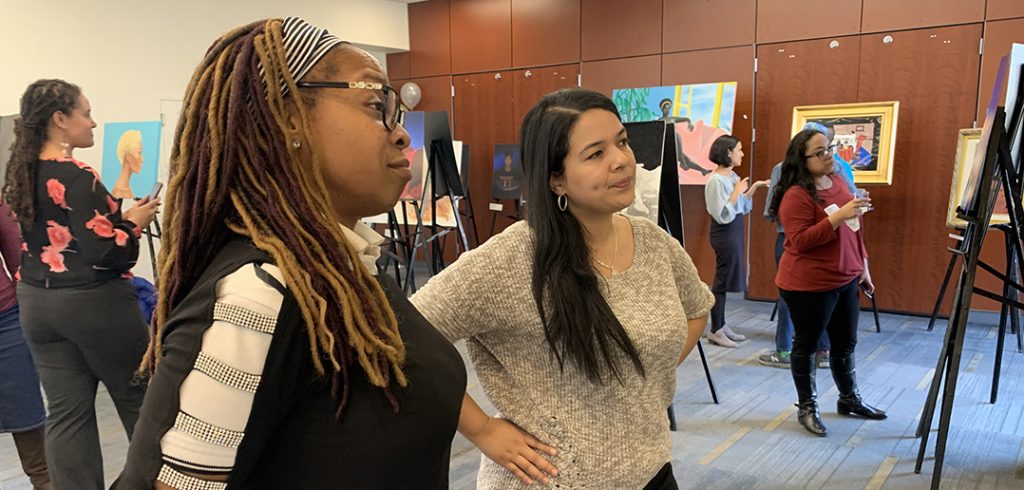
Delving Into the Heart of the Matter
The evening’s banquet also presented art as a way to move the diversity discussion forward. Three students took home prizes for the student case competitions.
Gabelli School junior Huyen Lam won third prize for a multimedia graphic that used photos and text to portray Bronx landmarks and common sights such as children playing under sprinklers and homeless begging on the streets. She represented her Vietnamese and Chinese background as a central feminine figure facing the action.
Second prize went to the hard-hitting video, “Bridging the Gap: Fordham University and The Bronx.” The video features Fordham students from the Bronx addressing the preconceived notions about the borough that they’ve encountered in their fellow classmates. Senior Kayla Valez and junior Dajasmin Rodriguez, both students at Fordham College at Rose Hill, created the piece.
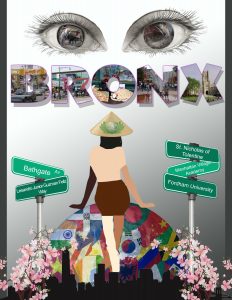
“The video speaks to the reality of the Bronx commuters,” said Valez. “So many students don’t know enough about the Bronx that isn’t just ‘Oooo, Arthur Avenue.’ It’s like any other city with lots of parts.”
First prize went to the essay, “A Mission of Seeking Difference,” by Gabelli senior Isabelle Hanson. In it, Hanson, whose father is Polish-American, and whose mother is from Taiwan, addresses micro-aggressions she experienced on campus. She said they’re reflective of American society as a whole, not simply Fordham.
“One trend is a tendency to talk about differences through a negative lens,” Lam said by phone from Fordham’s London Centre, where she is studying this semester. She said that many of the diversity conversations happening on college campuses should have happened in the home when people were young.
“By the time my friends learn about the magic of diversity, it’s harder to digest, because by then diversity becomes about quotas and tolerance,” she said.
And long-held views become entrenched.
“It’s really difficult to confront someone when they are having issues like this. There’s this tendency to deny, deny deny,” Lam said.
“They don’t realize that they’re doing it, or why they’re even thinking like this—even I do it—so it’s important to reflect.”
]]>
Enter the Fordham Mentoring Program. Now in its 15th year, the program connects alumni with current students in an effort to provide young professionals with someone they can turn to for guidance in their future careers.
A joint venture between the offices of Career Services and Alumni Relations, the program runs from October to May. Mentors are asked to commit to 24 hours a year with the intention of providing a few hours each month. Alumni from every undergraduate, graduate, and professional school can participate as mentors, and the program is open to all juniors and seniors.
What started with just a few dozen mentors in its first year has grown to include 216 alumni—and a host of success stories.
Preparing for the Professional World
Alumni mentors do everything from reviewing student resumes to attending networking events. There are also three annual events each year that mentors and mentees are encouraged to attend: a meet and greet, a networking skills workshop, and a mentor appreciation reception.
On Jan. 22, the program hosted this year’s networking skills workshop at the Lincoln Center Campus.
Spearheaded by Matthew Burns, FCRH ’13, assistant director for young alumni and student engagement, and Megan McDonald, FCRH ’14, assistant director of employer relations, the event began with a short presentation on general interviewing tips by Annette McLaughlin, director of career services.
McLaughlin, who worked in recruiting for several years, stressed the importance of preparation—researching and learning as much as possible about a company before interviewing. A candidate should also know what is important to them in a job, she said, practice their interviewing skills, and remember to relax during the interview.
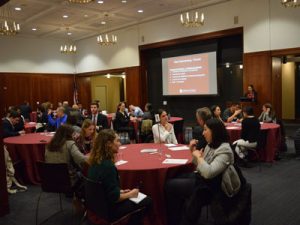
To offer some hands-on practice, the workshop consisted of a mock interview session focused on finessing a student’s interviewing skills. Mentor-student pairs sat at round tables for seven-minute “interviews,” with time allotted for introductions, one question, answers, and feedback. Students rotated seats when their time was up and continued doing so until the end of the workshop.
The workshop was just one of many ways the program strives to give students tools for their future early on in their careers.
“This program is unique in that it’s an opportunity for Fordham students to interact with alumni in a way that is guaranteed to provide career guidance and support before they begin their own career journey beyond Fordham’s gates. Many students crave such networking opportunities but don’t feel comfortable reaching out on their own, so the Mentoring Program initiates those relationships for them and coaches them on how to maintain a mentoring relationship for the duration of the program and after,” said McLaughlin.
Life Lessons From Experienced Mentors
Alumna Michelle Hopson, PCS ’08, and current Fordham College at Rose Hill senior Wanida “Ting” Yana were matched up as mentor and mentee last October. Yana, an international studies major with a double minor in sociology and humanitarian studies, was pleased to be matched up with Hopson, who works as a consultant for nonprofit organizations.
“She’s given me a lot of helpful advice because she’s also a consultant, which is one of the things I aspire to be. It was really good to be able to hear from someone who actually works in the career that I want to be [in],” Yana said of her mentor.
Yana also found common ground in their similar backgrounds, commenting that “Michelle’s ethnically Filipino and I’m from Thailand, so we both have that international background in a way. So it was easy to bond over that.”
Hopson, who has been involved in the program for several years, finds real value in imparting her wisdom onto current students. She said she employs a hands-off strategy as a mentor: “I’m not there to do any work … but really coaching, motivation, giving the tools, giving the resources.” She said she helps students through a variety of issues, “from the decision about the next step and going to school internationally, to what type of industry they should be in, to the day-to-day questions, like how do I deal with this boss who’s like this.” With these skills, Hopson hopes to give her mentees the tools to effectively and independently solve their problems.
The Benefits of Being a Mentor
Students are not the only ones who benefit from the program. Hopson says that thanks to her mentees, she has continued on her journey of being a lifelong learner.
“I always tell myself I mentor because I want to learn … I wanted to bring back the things that helped me become who I am. I had a mentor myself and I knew with just these life skills, and practical wisdom, and these strategies, I was able to be where I was, where I am today.”
One success story from the program comes from a mentor-mentee pair that have been in touch for nearly a decade. Christopher Gullotta, FCLC ’82, and Brandon Brown, GABELLI ’10, met in fall 2009 when they were matched up by the mentoring program.
According to Gullotta, Brown was at a major crossroads when they were first matched up as a pair. Brown was a scholarship athlete on Fordham’s football team who was considering a career in law after realizing the NFL was becoming less of a possibility. With Gullotta’s guidance, Brown ended up going to law school and now serves as the assistant director of pro scouting with the Philadelphia Eagles. The men have remained close friends.
“My wife and children have come to know Brandon well. We attend each other’s significant family gatherings. And I go to Philadelphia every year to visit with Brandon and catch an Eagles game,” said Gullotta.
Gullotta wanted to become a mentor after two of his professors, John Adam, S.J., and philosophy professor Bernard Gilligan, took a special interest in him. “[They] helped me develop the critical thinking and advocacy skills that I would not have survived without in law school or in private practice. They embodied the spirit of Fordham, and I try to do likewise.”
Hopson continues to be a mentor in the “Fordham way,” she said. “You are out there continuing to develop yourself, continuing to be a critical thinker, continuing to reflect, to compare yourself not to anybody else but to who you were yesterday, to keep growing, to keep burning off all that stuff that didn’t work, that worked yesterday and no longer works for today, and not getting stuck in the past. That’s really what growth is about and that’s, for me, what Fordham kind of equals.
“I took a train here, took two subways and I’d still do it every day if needed after a full day of work and talking to clients and doing all that stuff. It’s so rewarding and I know there’s a place for people like me here.”
That was the 2017 theme for the Fifth Annual Diversity Leadership in A Global Society Conference, which was held on March 8 in the McGinley Center at the Rose Hill campus.
Presented by the Offices of Career Services and Multicultural Affairs, the conference aimed to help participants recognize themselves as allies in creating a welcoming, safe and inclusive environment for individuals of different races, ethnicities, religions, genders, sexual orientation, socio-economic status, and political belief systems.
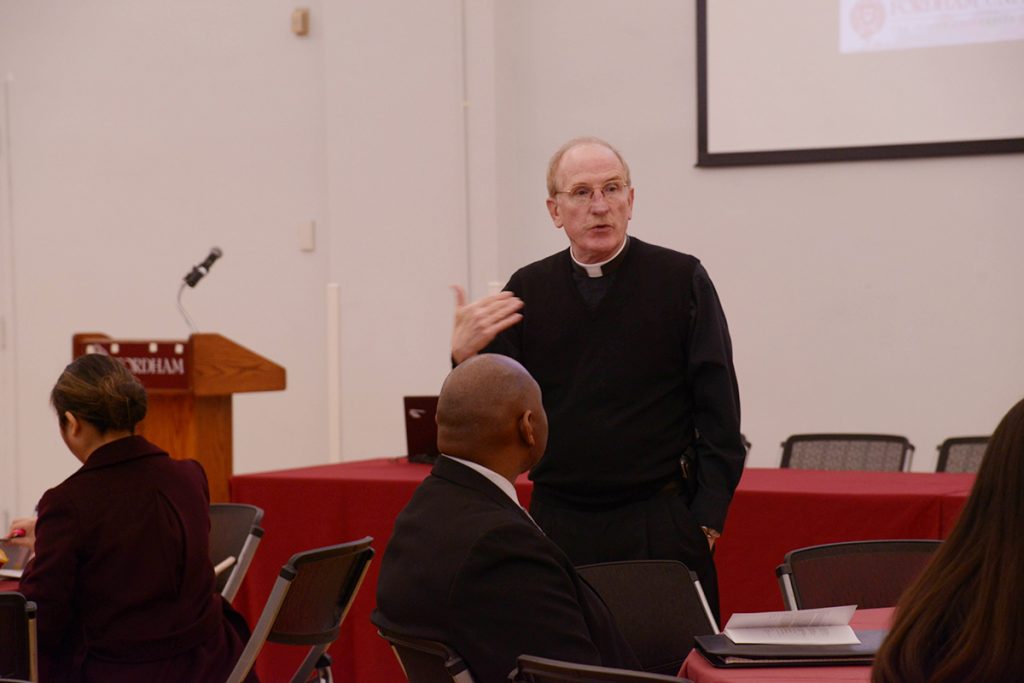
“If you look around the room, this is the future, not only at Fordham but also the future of our country,” said Joseph M. McShane, S.J., president of Fordham, who delivered the welcome remarks.
“For every event of this nature, let’s fill the room, spread the word, and build a strong and supportive effort in which everyone is respected, revered, and loved.”
The conference hosted several workshops about the skillset, tools, experiences, and attitudes that are key to building a diverse and inclusive workforce. Presenters included:
— health professionals from Bronx Lebanon Hospital explaining how residents, social workers, and program development professionals are trained to provide medical services to the Bronx’s culturally diverse community;
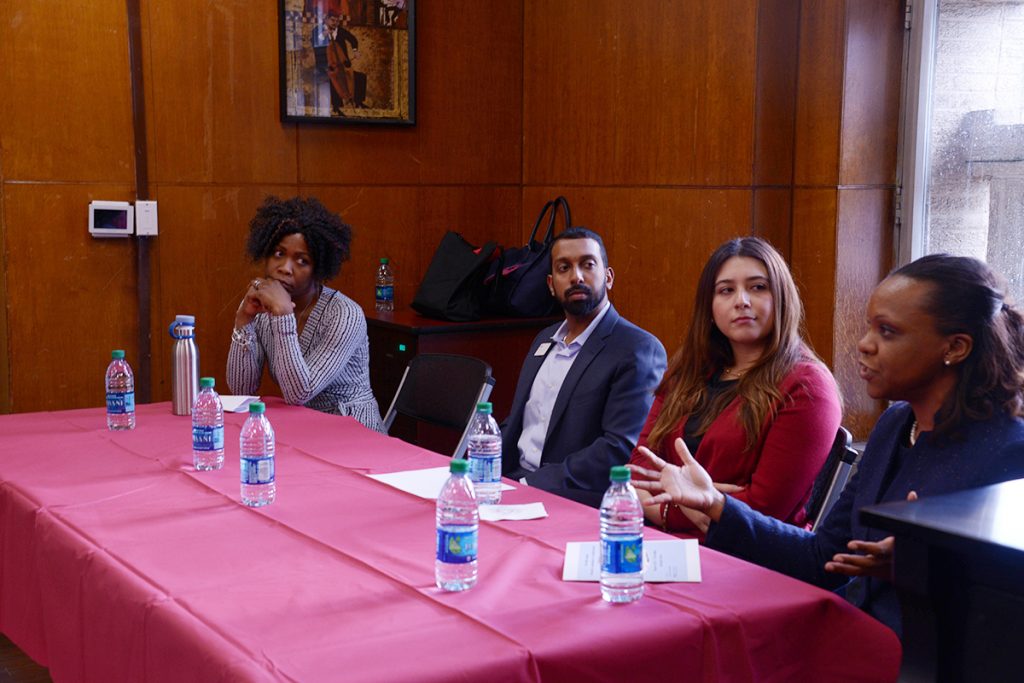
— experts from EY, Deloitte, KPMG, and PwC describing best practices for promoting diversity and inclusion, as well as how their companies respectively develop and advance diverse talent; and
— Lauren Click, director of community and public programs at the Bronx Museum of the Arts, sharing how the internationally recognized cultural institution promotes cross-cultural dialogues and diversity through its art exhibitions and programs.
Juan Carlos Matos, assistant dean and director of the office of multicultural affairs, who helped to organize the conference, held an informational session about one of Fordham’s newest alumni groups, Rainbow Rams. Through educational, professional, social, and service events and initiatives, the LGBTQ+ alumni chapter seeks to build meaningful connections between LGBTQ+ alumni, current students, and the University as a whole.
Matos said life after college can be challenging for Fordham LGBTQ+ alumni, who are trying to navigate the job search process and the workplace. In environments with little to no diversity, LGBTQ+ individuals often have to hide parts of their identities in order to feel accepted, he said.
“The optical experience of someone in the workplace impacts people, and it’s meaningful,” said Matos. “Having individuals that can then identify with other individuals with similar identities or similar lived experiences is just as valuable.”
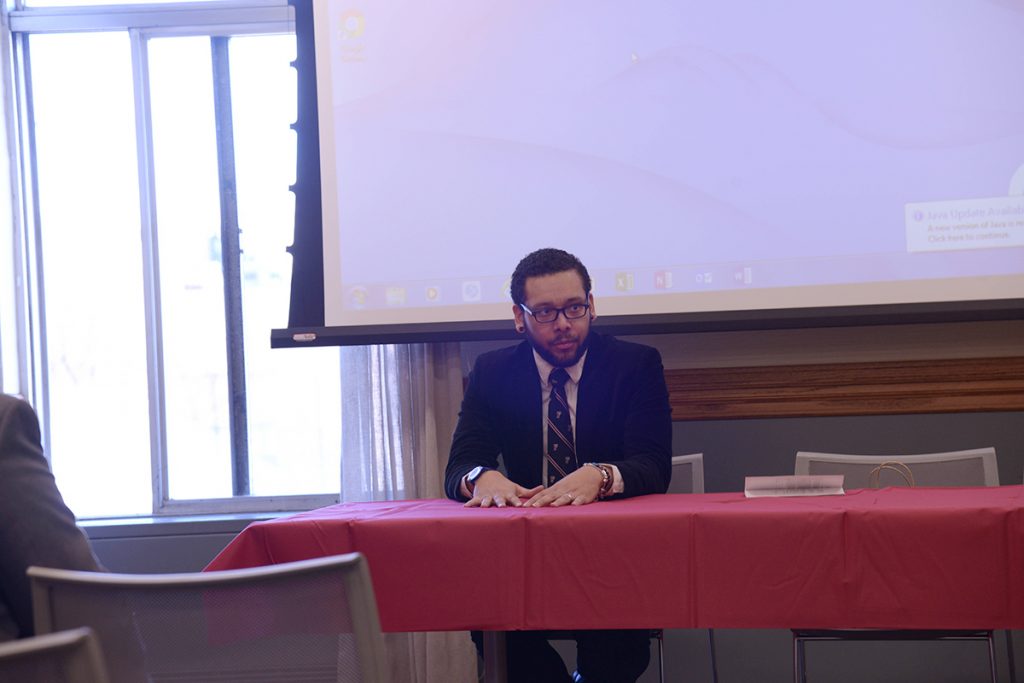
Matos said people of all backgrounds, races, and orientations must commit to making progressive movements toward equity all across the board. They must also stand up when language, behaviors, and attitudes about different groups are problematic, he said.
“In every field, we should have people that have diversity competencies to recognize when something isn’t aligning with diversity inclusion,” he said. “All of us should have the skillset to be able to talk about diversity inclusion beyond the identity that we each have.”
The conference concluded with an alumni panel discussion featuring Ramon Cabral, FCRH ’14, deputy district director at the U.S. House of Representatives; Yesenia Santana, FCRH ’14, a former educator at Harlem HBI and current social work intern at Manhattan Hunter Science High School; Sergio Lora, FCRH ’14, a construction crew leader at Habitat For Humanity West Hawaii; and Michael Soriano, FCRH ’13, a substance abuse counselor at St. Joseph’s Hospital.
Maria Aponte-Gonzalez, diversity initiatives coordinator at Fordham’s Career Services, said the goal was to give students insider perspectives on how to thrive in a multicultural world and work environment after college.
“A lot of students think the word diversity is only for a certain population, and it’s not,” she said. “ It’s about learning how to engage in the community that you want to get a job in. It’s broadening your concept about dealing with the world because you can’t always live in a little box. Eventually, you have to get out of the box.”
]]>Surrounded by students, alumni, and staff, Father McShane said, “It’s only when you break out of your own comfortable home, neighborhood, way of seeing things, that you’re stretched and that you grow and become leaders. To settle into what is familiar creates within us laziness of heart as well as mind.”
Father McShane’s remarks kicked off “Diversity Leadership in a Global Society,” a conference that addressed the theme of a weeklong campus-wide reflection on race relations in America. The event was organized by the Offices of Career Services (OCS) and Multicultural Affairs, and sponsored by Johnson & Johnson.
In a series of workshops and lectures, including a keynote address by Claude Mangum, PhD, professor emeritus of African and African-American studies, students were encouraged to embrace their differences in order to enhance their professional growth. The sooner they have the tools necessary to understand and embrace diversity, the easier it will be to apply to the workforce, said Maria Aponte, GSAS ’14, diversity initiatives coordinator for OCS.
Johnson & Johnson Chief Diversity Officer Anthony Carter, FCRH ’76, stressed the importance of diversity in the workforce.
“I’ve really gotten grounded in what that role means in terms of mission, vision, and purpose,” he said. “[It] collectively brings us all into a space where we have to share our differences and similarities in order to see our greatness.”
Determined to give back to the school that gave so much to him, Carter helped secure a $25,000 gift from the company to sponsor the conference and fuel Fordham’s mission of embracing diversity.
In the midst of growing racial tensions in the United States, this conference and week of reflection came at a perfect time, students said.
“One of the things a Jesuit university teaches us is to be mindful of changes in society and issues that effect everyone,” said Fordham College at Rose Hill senior Princess Chukwuneke.
“This week gets the whole university to reflect on the things that are really important.”
]]>Panelists will present on a variety of topics pertaining to finding balance through diversity on business teams and empowering within oneself on Saturday, Feb. 9 in the McGinley Center at the Rose Hill Campus.
The conference begins with registration at 9 a.m. and will end at 3 p.m. with a performance by Thirza DeFoe, Grammy Award winning artist from the Ojibwe and Oneida tribes of Wisconsin. She is best known for her sacred hoop dances.
The event is sponsored in part by the Office of Career Services and Office of Multicultural Affairs. For more information, contact Maria Aponte at (718) 817-4315 or [email protected].
]]>“When you build inclusion into a structure, what you build is trust, cohesion and unity,” said Lillian Rodríguez López (FCRH ’85), who leads the nonprofit membership organization that serves nearly 100 health and human services agencies in New York, New Jersey, Connecticut and Pennsylvania.

The keynote speaker for the Office of Career Services’ annual Diversity Networking Banquet, Rodríguez López said she didn’t believe the immigration debate had to do solely with how people arrive in this country.
“It’s whether or not we’re willing to accept that we are a country founded on the basis of freedom, diversity and multiculturalism,” she said to an audience of about 200 students and 20 recruiters from a variety of corporations.
“If we don’t accept that, and remember that is what made us great, we’re doomed to fail,” she added.
Globalization has drastically changed the world, rendering it increasingly diverse, Rodríguez López said. For companies to meet the challenge of operating among diverse cultures, they are going to have to do things differently.
“Why don’t we decide today that diversity just is? We don’t need to make a case for it,” she said. “We don’t need to defend it anymore, but we do need to make a case for inclusion.”
Companies should be deliberate about the inclusion of people of different races, colors and creeds.
“It means you make everyone welcome to bring their best to your work environment,” Rodríguez López said. “When you build inclusion, it shows you value diversity and success. For the companies here today, thank you for taking the time to invest in our students. You’re really investing in your own future.

“All of these students know their communities,” she said. “These are our next leaders and their trajectory within Fordham and outside of this great institution, will set the stage for how companies and this country succeed or fail.”
The Diversity Networking Banquet gives employers an opportunity to meet with students with diversity recruitment in mind. Representatives from more than 16 corporations attended the event, including those who are CORE partners supporting the initiatives of Fordham’s Office of Career Services.
They are: Deloitte, KPMG, Memorial Sloan-Kettering Cancer Center, Northwestern Mutual Financial Network—the Russo Group, Northwestern Mutual Financial Network—the White Plains Group, Standard Motor Products and Target.
Sodexo, which manages Fordham’s food service program, provided support for the banquet.
]]>The Alumni and Student Mentoring Program has earned high marks for allowing students to job shadow, visit companies and attend special networking receptions, as well as foster one-on-one relationships with successful graduates.
“Mentoring Fordham students is a great way to reconnect with the University and to give back, in a tangible and personalized way,” said Chris Gulotta, FCLC ’82, LAW ’88. “Seeing your mentees grow before your eyes is as exciting as it is rewarding. These are relationships that will last for years.”
Mentors are linked with students by matching the work experience and background knowledge of alumni with undergraduates’ interests and aspirations, as shown through their majors, activities and internships.
The program began in 2005 with 45 mentorship pairs, a number which has since tripled.
For example, last year a director from Moody’s Investors Service was paired with a sophomore from Fordham College at Lincoln Center, while a senior account director from the advertising agency BBDO was linked to a sophomore from the College of Business Administration.
Fordham College at Rose Hill was represented as well. A senior there teamed up with a marketing and media manager at Opera America. Other companies represented in the program included Burlington Coat Factory, Ralph Lauren, the American Cancer Society and American Express.
The characteristics of the mentorship are set by the graduate. The method of communication, be it phone or e-mail, is determined at the outset of the program.
The application deadline for the current academic year is Sept. 30. It will be followed by a meet-and-greet reception at the Lincoln Center campus on Oct. 29.
For more information, contact Caitlin Ahern at [email protected] or (212) 636-7068, or visithttp://www.fordham.edu/alumni_relations/mentor.shtml.
The Alumni and Student Mentoring Program is run jointly by the Office of Career Services and Office of Alumni Relations.
]]>Starting in November, Fordham alumni will be able to receive consultations from Annette McLaughlin, director of human resources and learning and development for the Response Companies, as a service offered by Fordham’s career services office.
McLaughlin has worked in the job search and recruitment industry for 22 years. Response Companies, which has five offices in the tri-state area, is one of the top five New York-based recruitment firms, according to Crain’s NY Business.
According to Andrew Cronan, executive director for career services at Fordham, the demand for career assistance from alumni has increased as the economy has weakened. Skills like networking, resumé building, counseling, job search techniques and job placement are among the services the office hopes to offer.
“In this difficult economy we are taking a pro-active approach,” said Cronan. “We have come up with a temporary solution to handle what we think will be an increase in demand without having to charge fees for that counseling service to alumni.”
Consultations and workshops will be available on both the Rose Hill and the Lincoln Center campuses, in the career services offices. For further information on setting up a consultation or attending a workshop, contact Annette McLaughlin at (212) 843-9129.
]]>